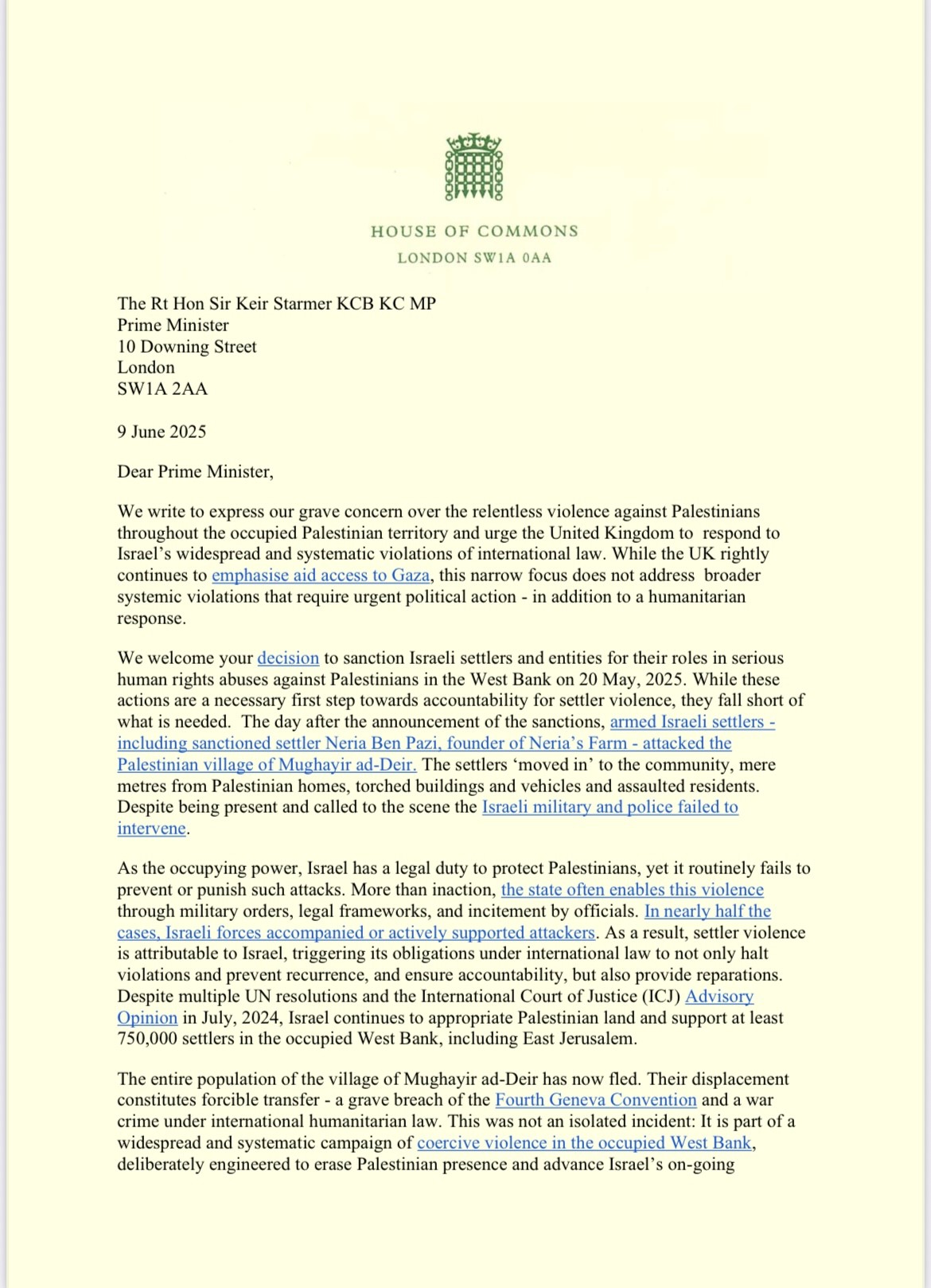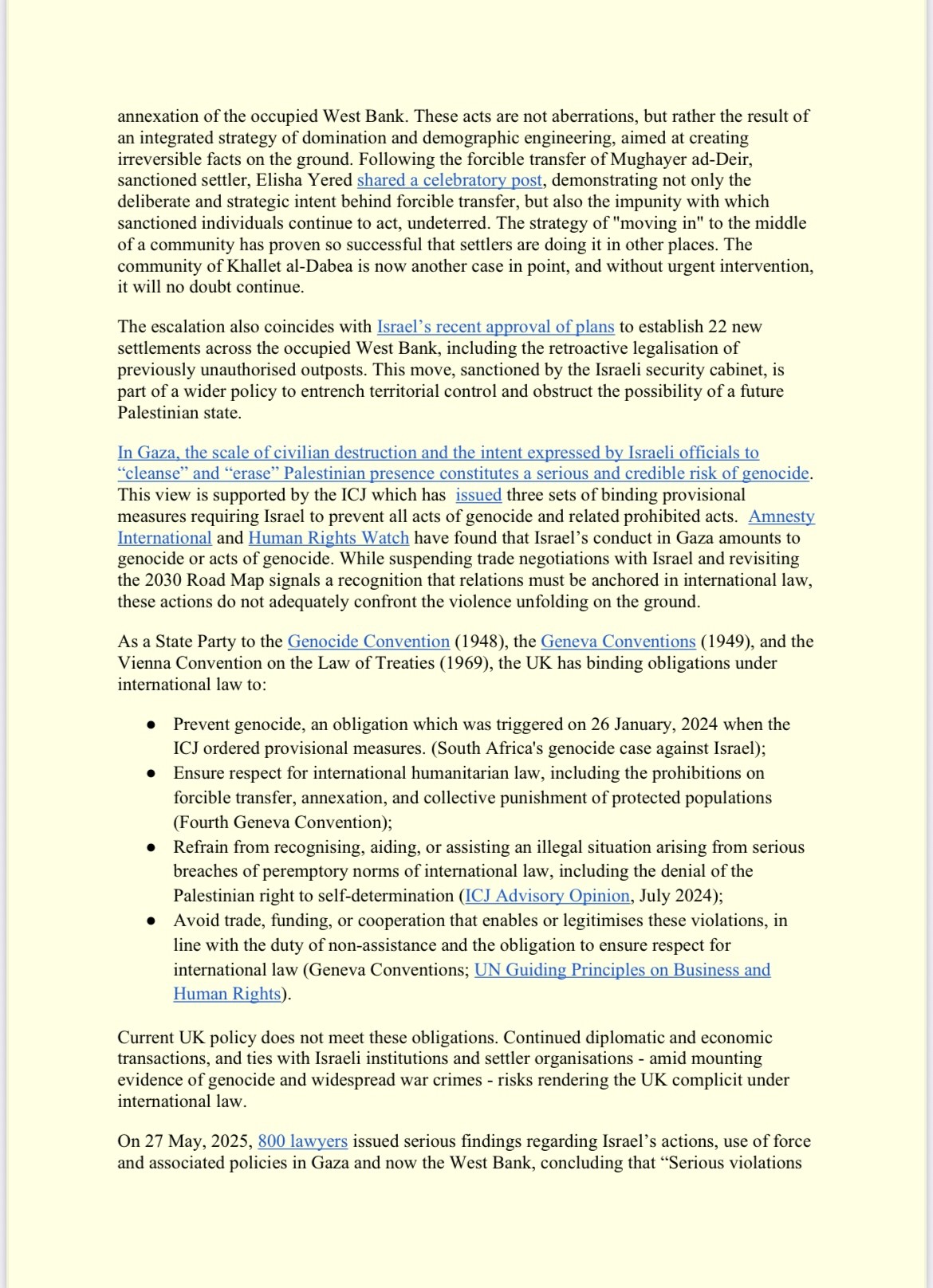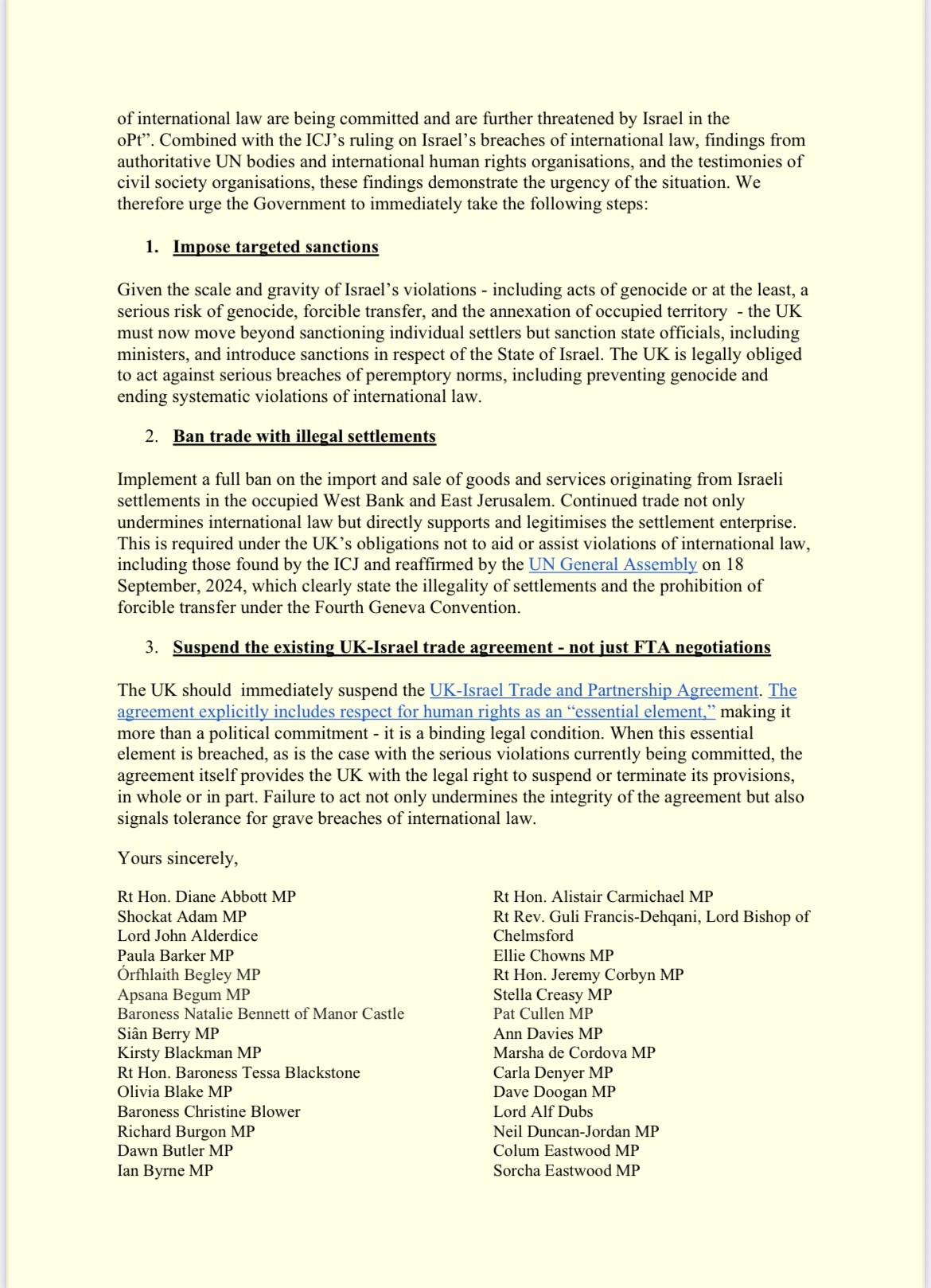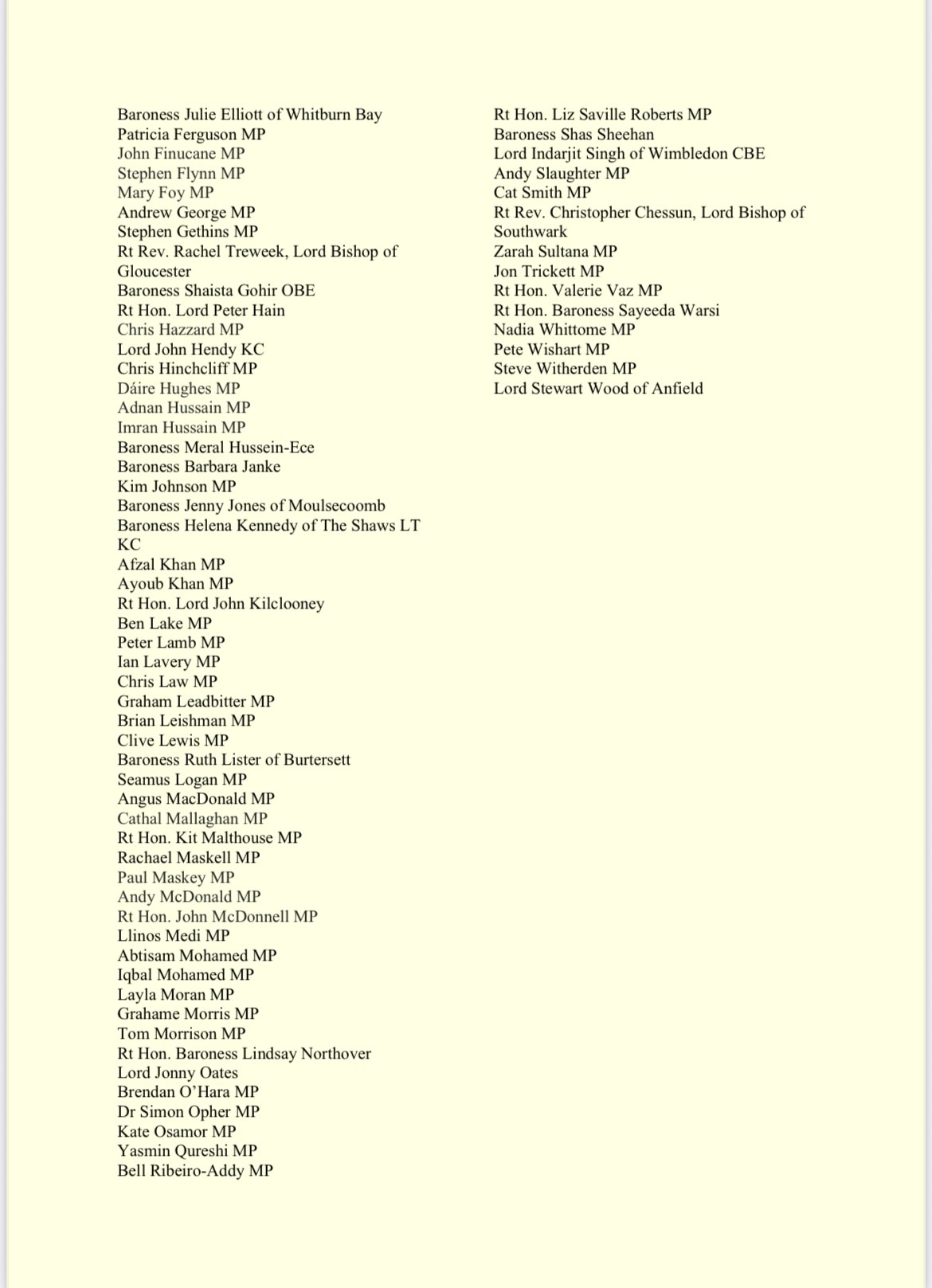Caabu Press Release: 96 UK Parliamentarians demand sanctions on Israel for war crimes against Palestinians
9 June 2025
In a letter to the Prime Minister, Sir Keir Starmer, 96 UK parliamentarians have demanded sanctions on Israel for war crimes against Palestinians and systematic violations of international law, including imposing targeted sanctions, a ban on trade with illegal settlements, and a suspension of the existing UK-Israel trade agreement.
Responding to the letter, Caabu's Head of Parliamentary Affairs, Joseph Willits, said:
"This letter shows that there is increasing parliamentary support for the UK to take tougher action against Israel. As Palestinians face violent erasure, including Israeli imposed genocide, starvation and ethnic cleansing, the UK government simply is not doing enough, and an increasing number of parliamentarians are also coming to this realisation.
Successive governments cannot claim to not know how communities across the West Bank are being violently dispossessed and forcibly transferred, which many of the signatories have visited.
What will it take for UK government action to match up with the horrifying situation and systemic violence on the ground, and to act on what parliamentarians, the British public, and most importantly, Palestinians have long been saying? Palestinians deserve an end to these horrors, leading to proper justice and accountability."
Allegra Pacheco, chief of party for the West Bank Protection Consortium, said:
"Entire Palestinian communities across the occupied West Bank are being forcibly transferred - not by accident - but by design. Israel is creating a coercive environment to push Palestinians off their land and cement permanent control. Armed settlers attack villages, destroy livelihoods, and block access to basic services, with full impunity and often with military backing. Officials openly incite violence while legalising new settlements to entrench annexation.
This is not the failure of the state - it is the strategy of the state: to erase Palestinian presence and create irreversible facts on the ground. The forcible transfer of Mughayir ad-Deir is yet another warning. Unless the international community acts, more communities like Khallet al-Dabea, or Ras al Ain al Ouja will be next."
Notes to editors:
- For more information or interviews contact Joseph Willits [email protected]
Dear Prime Minister,
We write to express our grave concern over the relentless violence against Palestinians throughout the occupied Palestinian territory and urge the United Kingdom to respond to Israel’s widespread and systematic violations of international law. While the UK rightly continues to emphasise aid access to Gaza, this narrow focus does not address broader systemic violations that require urgent political action - in addition to a humanitarian response.
We welcome your decision to sanction Israeli settlers and entities for their roles in serious human rights abuses against Palestinians in the West Bank on 20 May, 2025. While these actions are a necessary first step towards accountability for settler violence, they fall short of what is needed. The day after the announcement of the sanctions, armed Israeli settlers - including sanctioned settler Neria Ben Pazi, founder of Neria’s Farm - attacked the Palestinian village of Mughayir ad-Deir. The settlers ‘moved in’ to the community, mere metres from Palestinian homes, torched buildings and vehicles and assaulted residents. Despite being present and called to the scene the Israeli military and police failed to intervene.
As the occupying power, Israel has a legal duty to protect Palestinians, yet it routinely fails to prevent or punish such attacks. More than inaction, the state often enables this violence through military orders, legal frameworks, and incitement by officials. In nearly half the cases, Israeli forces accompanied or actively supported attackers. As a result, settler violence is attributable to Israel, triggering its obligations under international law to not only halt violations and prevent recurrence, and ensure accountability, but also provide reparations. Despite multiple UN resolutions and the International Court of Justice (ICJ) Advisory Opinion in July, 2024, Israel continues to appropriate Palestinian land and support at least 750,000 settlers in the occupied West Bank, including East Jerusalem.
The entire population of the village of Mughayir ad-Deir has now fled. Their displacement constitutes forcible transfer - a grave breach of the Fourth Geneva Convention and a war crime under international humanitarian law. This was not an isolated incident: It is part of a widespread and systematic campaign of coercive violence in the occupied West Bank, deliberately engineered to erase Palestinian presence and advance Israel’s on-going annexation of the occupied West Bank. These acts are not aberrations, but rather the result of an integrated strategy of domination and demographic engineering, aimed at creating irreversible facts on the ground. Following the forcible transfer of Mughayer ad-Deir, sanctioned settler, Elisha Yered shared a celebratory post, demonstrating not only the deliberate and strategic intent behind forcible transfer, but also the impunity with which sanctioned individuals continue to act, undeterred. The strategy of "moving in" to the middle of a community has proven so successful that settlers are doing it in other places. The community of Khallet al-Dabea is now another case in point, and without urgent intervention, it will no doubt continue.
The escalation also coincides with Israel’s recent approval of plans to establish 22 new settlements across the occupied West Bank, including the retroactive legalisation of previously unauthorised outposts. This move, sanctioned by the Israeli security cabinet, is part of a wider policy to entrench territorial control and obstruct the possibility of a future Palestinian state.
In Gaza, the scale of civilian destruction and the intent expressed by Israeli officials to “cleanse” and “erase” Palestinian presence constitutes a serious and credible risk of genocide. This view is supported by the ICJ which has issued three sets of binding provisional measures requiring Israel to prevent all acts of genocide and related prohibited acts. Amnesty International and Human Rights Watch have found that Israel’s conduct in Gaza amounts to genocide or acts of genocide. While suspending trade negotiations with Israel and revisiting the 2030 Road Map signals a recognition that relations must be anchored in international law, these actions do not adequately confront the violence unfolding on the ground.
As a State Party to the Genocide Convention (1948), the Geneva Conventions (1949), and the Vienna Convention on the Law of Treaties (1969), the UK has binding obligations under international law to:
- Prevent genocide, an obligation which was triggered on 26 January, 2024 when the ICJ ordered provisional measures. (South Africa's genocide case against Israel);
- Ensure respect for international humanitarian law, including the prohibitions on forcible transfer, annexation, and collective punishment of protected populations (Fourth Geneva Convention);
- Refrain from recognising, aiding, or assisting an illegal situation arising from serious breaches of peremptory norms of international law, including the denial of the Palestinian right to self-determination (ICJ Advisory Opinion, July 2024);
- Avoid trade, funding, or cooperation that enables or legitimises these violations, in line with the duty of non-assistance and the obligation to ensure respect for international law (Geneva Conventions; UN Guiding Principles on Business and Human Rights).
Current UK policy does not meet these obligations. Continued diplomatic and economic transactions, and ties with Israeli institutions and settler organisations - amid mounting evidence of genocide and widespread war crimes - risks rendering the UK complicit under international law.
On 27 May, 2025, 800 lawyers issued serious findings regarding Israel’s actions, use of force and associated policies in Gaza and now the West Bank, concluding that “Serious violations of international law are being committed and are further threatened by Israel in the oPt”. Combined with the ICJ’s ruling on Israel’s breaches of international law, findings from authoritative UN bodies and international human rights organisations, and the testimonies of civil society organisations, these findings demonstrate the urgency of the situation. We therefore urge the Government to immediately take the following steps:
- Impose targeted sanctions
Given the scale and gravity of Israel’s violations - including acts of genocide or at the least, a serious risk of genocide, forcible transfer, and the annexation of occupied territory - the UK must now move beyond sanctioning individual settlers but sanction state officials, including ministers, and introduce sanctions in respect of the State of Israel. The UK is legally obliged to act against serious breaches of peremptory norms, including preventing genocide and ending systematic violations of international law.
- Ban trade with illegal settlements
Implement a full ban on the import and sale of goods and services originating from Israeli settlements in the occupied West Bank and East Jerusalem. Continued trade not only undermines international law but directly supports and legitimises the settlement enterprise. This is required under the UK’s obligations not to aid or assist violations of international law, including those found by the ICJ and reaffirmed by the UN General Assembly on 18 September, 2024, which clearly state the illegality of settlements and the prohibition of forcible transfer under the Fourth Geneva Convention.
- Suspend the existing UK-Israel trade agreement - not just FTA negotiations
The UK should immediately suspend the UK-Israel Trade and Partnership Agreement. The agreement explicitly includes respect for human rights as an “essential element,” making it more than a political commitment - it is a binding legal condition. When this essential element is breached, as is the case with the serious violations currently being committed, the agreement itself provides the UK with the legal right to suspend or terminate its provisions, in whole or in part. Failure to act not only undermines the integrity of the agreement but also signals tolerance for grave breaches of international law.




Signed by:
Rt Hon. Diane Abbott MP
Shockat Adam MP
Lord John Alderdice
Paula Barker MP
Órfhlaith Begley MP
Apsana Begum MP
Baroness Natalie Bennett of Manor Castle
Siân Berry MP
Kirsty Blackman MP
Rt Hon. Baroness Tessa Blackstone
Olivia Blake MP
Baroness Christine Blower
Richard Burgon MP
Dawn Butler MP
Ian Byrne MP
Rt Hon. Alistair Carmichael MP
Rt Rev. Guli Francis-Dehqani, Lord Bishop of Chelmsford
Ellie Chowns MP
Rt Hon. Jeremy Corbyn MP
Stella Creasy MP
Pat Cullen MP
Ann Davies MP
Marsha de Cordova MP
Carla Denyer MP
Dave Doogan MP
Lord Alf Dubs
Neil Duncan-Jordan MP
Colum Eastwood MP
Sorcha Eastwood MP
Baroness Julie Elliott of Whitburn Bay
Patricia Ferguson MP
John Finucane MP
Stephen Flynn MP
Mary Foy MP
Andrew George MP
Stephen Gethins MP
Rt Rev. Rachel Treweek, Lord Bishop of Gloucester
Baroness Shaista Gohir OBE
Rt Hon. Lord Peter Hain
Chris Hazzard MP
Lord John Hendy KC
Chris Hinchcliff MP
Dáire Hughes MP
Adnan Hussain MP
Imran Hussain MP
Baroness Meral Hussein-Ece
Baroness Barbara Janke
Kim Johnson MP
Baroness Jenny Jones of Moulsecoomb
Baroness Helena Kennedy of The Shaws LT KC
Afzal Khan MP
Ayoub Khan MP
Rt Hon. Lord John Kilclooney
Ben Lake MP
Peter Lamb MP
Ian Lavery MP
Chris Law MP
Graham Leadbitter MP
Brian Leishman MP
Clive Lewis MP
Baroness Ruth Lister of Burtersett
Seamus Logan MP
Angus MacDonald MP
Cathal Mallaghan MP
Rt Hon. Kit Malthouse MP
Rachael Maskell MP
Paul Maskey MP
Andy McDonald MP
Rt Hon. John McDonnell MP
Llinos Medi MP
Abtisam Mohamed MP
Iqbal Mohamed MP
Layla Moran MP
Grahame Morris MP
Tom Morrison MP
Rt Hon. Baroness Lindsay Northover
Lord Jonny Oates
Brendan O’Hara MP
Dr Simon Opher MP
Kate Osamor MP
Yasmin Qureshi MP
Bell Ribeiro-Addy MP
Rt Hon. Liz Saville Roberts MP
Baroness Shas Sheehan
Lord Indarjit Singh of Wimbledon CBE
Andy Slaughter MP
Cat Smith MP
Rt Rev. Christopher Chessun, Lord Bishop of Southwark
Zarah Sultana MP
Jon Trickett MP
Rt Hon. Valerie Vaz MP
Rt Hon. Baroness Sayeeda Warsi
Nadia Whittome MP
Pete Wishart MP
Steve Witherden MP
Lord Stewart Wood of Anfield
